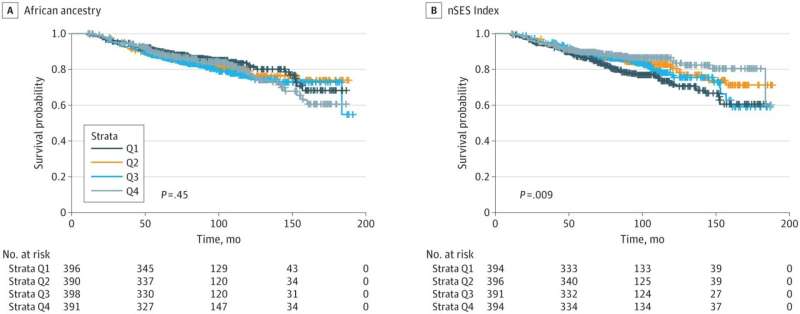This article has been reviewed according to Science X's editorial process and policies. Editors have highlighted the following attributes while ensuring the content's credibility:
fact-checked
peer-reviewed publication
proofread
Genetic ancestry and social environment may influence how aggressive breast cancer is in Black women

For Black women, breast cancer is the most commonly diagnosed cancer, and as of 2019 it has surpassed lung cancer as the leading cause of cancer death in this population, according to the American Cancer Society. Additionally, studies have shown a high prevalence of triple-negative breast cancer (TNBC), an aggressive subtype of breast cancer among younger Black women and those of African descent.
Black women continue to experience disparities in breast cancer diagnosis and treatment, leading to increased mortality of up to 40% higher than white women. The reasons for this are multi-factorial, including social, economic and structural factors. Understanding the relative influence of genetic and social environmental factors on breast cancer risk and outcomes in Black women is important for appropriately directing services for early detection and treatment in this population.
Researchers at Rutgers Cancer Institute of New Jersey and RWJBarnabas Health, the state's leading cancer program and only National Cancer Institute-designated Comprehensive Cancer Center, examined associations between African genetic ancestry, neighborhood social environment, and outcomes in Black breast cancer survivors.
Key details:
- The analysis was based on the Women's Circle of Health Study and the Women's Circle of Health Follow-Up Study.
- This population-based cohort study enrolled self-identified Black women aged 20 to 75 years with histologically confirmed breast cancer from June 2005 to May 2019 and followed them up until death or censoring in September 2021.
- Participants lived in 10 New Jersey counties. Data were analyzed between December 2022 and April 2023.
- Genetic data were obtained from saliva samples and analyzed to estimate percentage of African genetic ancestry.
- An index of neighborhood socioeconomic status was linked to participants' residential census tracts at diagnosis.
African genetic ancestry was more strongly associated with tumor subtype than mortality. Compared with genetic ancestry, mediating pathways related to social environments may be more important for survival among Black breast cancer survivors.
The paper is published in the journal JAMA Network Open.
More information: Hari S. Iyer et al, Neighborhood Disadvantage, African Genetic Ancestry, Cancer Subtype, and Mortality Among Breast Cancer Survivors, JAMA Network Open (2023). DOI: 10.1001/jamanetworkopen.2023.31295

















